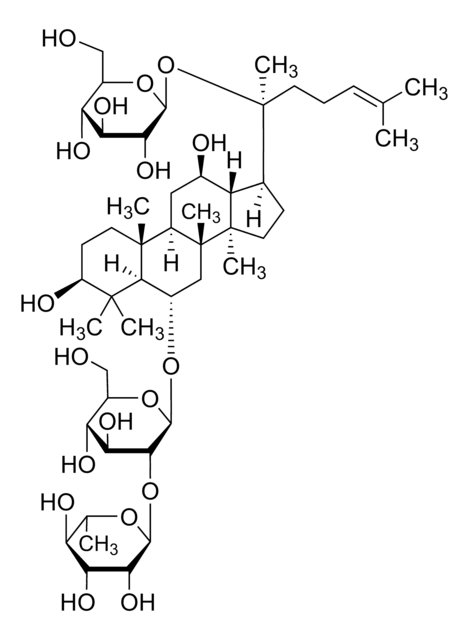02578
(±)-épichlorohydrine
analytical standard
Synonyme(s) :
(±)-2-(Chlorométhyl)oxirane, 1-Chloro-2,3-époxypropane
About This Item
Produits recommandés
Qualité
analytical standard
Niveau de qualité
Densité de vapeur
3.2 (vs air)
Pression de vapeur
13.8 mmHg ( 21.1 °C)
Pureté
≥99.9% (GC)
Température d'inflammation spontanée
779 °F
Durée de conservation
limited shelf life, expiry date on the label
Limite d'explosivité
21 %
Technique(s)
HPLC: suitable
gas chromatography (GC): suitable
Indice de réfraction
n20/D 1.438 (lit.)
n20/D 1.438
Point d'ébullition
115-117 °C (lit.)
Pf
−57 °C (lit.)
Densité
1.183 g/mL at 25 °C (lit.)
Application(s)
cleaning products
cosmetics
environmental
food and beverages
personal care
Format
neat
Chaîne SMILES
ClCC1CO1
InChI
1S/C3H5ClO/c4-1-3-2-5-3/h3H,1-2H2
Clé InChI
BRLQWZUYTZBJKN-UHFFFAOYSA-N
Vous recherchez des produits similaires ? Visite Guide de comparaison des produits
Description générale
Application
It may be used as a reference standard for the analysis of (±)-ECH in drinking water by ion chromatography and in effluent water from wastewater treatment plants by HS-solid phase microextraction (HS-SPME) combined with GC-flame ionization detector (GC-FID) and GC-ECD.
Mention d'avertissement
Danger
Mentions de danger
Classification des risques
Acute Tox. 3 Dermal - Acute Tox. 3 Inhalation - Acute Tox. 3 Oral - Carc. 1B - Eye Dam. 1 - Flam. Liq. 3 - Repr. 2 - Skin Corr. 1B - Skin Sens. 1
Code de la classe de stockage
3 - Flammable liquids
Classe de danger pour l'eau (WGK)
WGK 3
Point d'éclair (°F)
82.4 °F
Point d'éclair (°C)
28 °C
Équipement de protection individuelle
Faceshields, Gloves, Goggles, type ABEK (EN14387) respirator filter
Faites votre choix parmi les versions les plus récentes :
Déjà en possession de ce produit ?
Retrouvez la documentation relative aux produits que vous avez récemment achetés dans la Bibliothèque de documents.
Les clients ont également consulté
Notre équipe de scientifiques dispose d'une expérience dans tous les secteurs de la recherche, notamment en sciences de la vie, science des matériaux, synthèse chimique, chromatographie, analyse et dans de nombreux autres domaines..
Contacter notre Service technique














